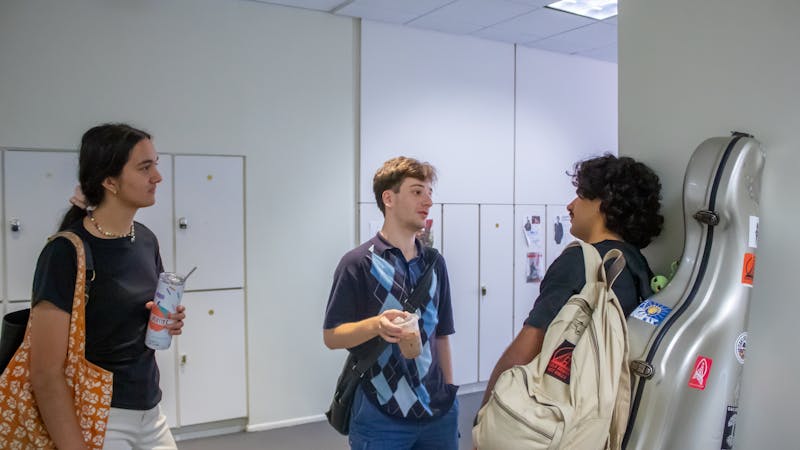Black at Rice: Malaika Bergner fosters a found community

Zeisha Bennett / Thresher
When Black Student Association President Malaika Bergner came to Rice, she and a group of other Black freshmen girls started eating lunch together.
“The stares we would get from people and the awkwardness were really hard to ignore,” Bergner, a Martel College senior, said. “Once we even got asked if we were in a BSA meeting by a random student, but the whole time it was just a bunch of Black people eating lunch and hanging out together.”
Bergner attributes this incident to Rice’s relatively low population of Black students.
“Compared to my high school, Rice has a lot fewer Black students, which I didn’t realize coming here,” Bergner said. “I personally was not used to being such a small minority.”
Bergner came to Rice from Chicago, which is approximately 29% Black to Houston’s 23%, according to the most recent U.S. Census. Her high school’s student body was 25% Black, whereas Rice’s is 12% Black.
“I felt like I couldn’t express my full Blackness because I didn’t have many Black students in [Martel],” Bergner said. “I felt really inauthentic and like I was performing an act. I still had fun as an underclassman. It was just like something was missing.”
To replace the parts of her college experience that she felt were lacking in racial representation, Bergner sought out environments where she could connect with more Black students.
“I am very conscious of the fact that I am often either the only Black person or one out of, like, three, so it pushed me to find classroom spaces where I wouldn’t be the only one,” Bergner said.
Outside of the classroom, Bergner sought out the BSA to fill in these gaps in her environment. The BSA was established in the 1970s to provide opportunities for Rice’s Black population.
“Being around my community motivates me, inspires me and revitalizes me when I am feeling like an impostor at Rice,” Bergner said. “I think that at some schools that can get kind of lost, but because Rice is so small, and we have so many clubs that are focused on Black students’ needs, we have developed this community that feels very supportive.”
As the 2022-2023 BSA president, Bergner said she hopes to expand the BSA and provide a welcoming environment for students like her. However, Bergner acknowledges that there are difficulties in being a minority on campus, urging Rice to provide more support for Black students who experience similar conflicts she has noticed in her own life.
“I have made friendships with Black students at this school that will last a lifetime, all while getting one of the best educations that I could have ever asked for. I am grateful for getting to experience this for nearly four years, but I am also highly critical of the way that this campus fails to fully support its Black students,” Bergner said. “It needs to start with the administration prioritizing Black students as an underrepresented population — listening to them, understanding their needs and meeting them with tangible actions.”
Despite the difficulties that Bergner has experienced, she still finds that Rice and the Black community she found within have positively shaped her life.
“I didn’t know that I could be so loved [and] appreciated by not just a couple, but an entire community of people,” Bergner said. “My mom often talks to me about how far I’ve come as a young woman and how much she has watched me change into a more confident, independent and joyful person.”
For Bergner, that joy is crucial to encapsulating the complexity of Black student life at Rice.
“I won’t lie and say I haven’t experienced a fair share of microaggressions from people who don’t look like me, and I know that there are people in my community who experience even more of these than I do,” Bergner said. “But I want to emphasize with my whole chest that in spite of all of this, Black Rice students find joy. I have hope for Rice’s future as a school where Black students can be authentic, fully supported and empowered to express their interests and lift their voices.”
More from The Rice Thresher

Over 1,000 students petition against new meal plan
When Konstantin Savvon opened the Housing and Dining email announcing the new unlimited meal plan, he was instantly concerned about the impact on off-campus students like himself.

Rice shuttle bus drivers reflect on changes and connections behind the wheel
Martine Stewart has spent the past year behind the wheel of Rice’s greater loop shuttle, circling the inner campus from the early morning to late afternoon. She said she has come to recognize many of her regular riders – not just their faces, but the exact spots where they wait to be picked up.

Music majors at Rice’s Shepherd School tackle busy schedules, future goals
Cirdan Vonnahme began playing the cello at 4 years old. After winning his first competition at 11 and debuting with an orchestra, he realized he wouldn’t mind playing the cello for life.

Please note All comments are eligible for publication by The Rice Thresher.